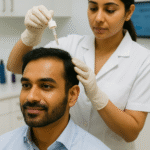Why Is a Postpartum Skincare Routine Crucial for Healthy Skin?
- Home
- Skin specialist
- postpartum skin care

A postpartum skincare routine is essential for maintaining healthy skin by addressing hormonal fluctuations that can lead to dryness, acne, and hyperpigmentation. These changes compromise the skin’s barrier and hydration levels. A targeted regimen using gentle, hydrating products supports the skin’s natural repair processes and barrier function. Consistent care mitigates common postpartum issues, enhancing resilience and well-being. For personalised guidance, consulting a trusted skin clinic in Chennai can provide further insights into ideal skincare practices for postpartum recovery.
Key Takeaways
- Postpartum skincare addresses hormonal changes impacting skin texture and condition, promoting healthy, resilient skin.
- Consistent skincare routines mitigate issues like dryness, acne, and hyperpigmentation during the postpartum period.
- Gentle, hydrating products restore and support the skin’s natural barrier function.
- Targeted ingredients like hyaluronic acid and ceramides enhance hydration and elasticity.
- Daily sun protection prevents UV damage and further pigmentation problems in sensitive postpartum skin.
Why Is a Postpartum Skin Care Routine Crucial for Healthy Skin?
Postpartum skin undergoes significant changes due to hormonal fluctuations, often resulting in concerns such as acne, pigmentation, and dryness.
An effective skincare routine can mitigate these issues by supporting the skin’s natural barrier and promoting regeneration.
Selecting the right postpartum skincare products is essential to protect and maintain healthy skin during this changing period.
What Skin Changes Occur During Your Postpartum Skincare Journey?
During the postpartum period, hormonal fluctuations can greatly impact the skin, leading to various changes that necessitate a tailored skincare routine.
Postpartum skin changes often involve decreased skin elasticity and compromised skin hydration, intensifying existing skin concerns. Many individuals experience acne breakouts due to altered sebum production.
Stretch marks may also appear as a result of rapid stretching of the skin during pregnancy. Sensitive skin is another common issue, often reacting to previously tolerated products.
These skin conditions underscore the importance of adopting a postpartum skincare routine tailored to manage these alterations. Clinical evidence suggests that addressing these specific skin needs can aid in the recovery and maintenance of healthy skin, emphasising the importance of understanding and managing postpartum skin changes.
How Can a Skincare Routine Help With Postpartum Skin Issues?
A well-structured skincare routine is indispensable for addressing postpartum skin issues, as it systematically targets the unique changes experienced during this period. Hormonal fluctuations and physiological adaptations can lead to common postpartum skin concerns such as melasma, acne, and loss of elasticity.
A tailored post-pregnancy skincare routine can effectively support overall skin health by promoting cellular turnover and hydration. Scientific evidence suggests that consistent application of topical agents can improve skin elasticity, texture, and firmness by enhancing collagen synthesis and moisture retention.
Additionally, incorporating antioxidants and anti-inflammatory ingredients in a postpartum skincare routine can mitigate oxidative stress and reduce inflammation. It is also important to avoid products that strip the skin of its natural oils, as this can worsen dryness and irritation. By addressing these postpartum skin changes, a strategic skincare routine can markedly improve the skin’s appearance and resilience during the postpartum period.
Which Postpartum Skincare Products Best Protect Your Skin Today?
How can individuals choose the most effective postpartum skincare products to protect their skin during this transformative time?
Evidence suggests that postpartum skin care should prioritise formulations that address specific postpartum skin concerns. Hyaluronic acid and ceramides are recommended to moisturise your skin and restore the skin barrier.
Vitamin C serums can help even out skin tone and enhance skin health by reducing hyperpigmentation. Incorporating gentle exfoliants, such as lactic acid, can promote cellular turnover without irritation.
Products free from harsh chemicals and fragrances are essential to protect your skin from potential allergens. Additionally, natural oils like jojoba and almond oil can nourish your skin, offering both hydration and protection.
Selecting scientifically backed skincare products can optimise postpartum skin recovery.
What Happens to Your Skin After Pregnancy and How to Care for It?
The postpartum period presents unique dermatological changes due to hormonal fluctuations, impacting skin texture and condition.
Utilising skincare products that are safe for post-pregnancy, such as those free from retinoids and certain essential oils, is essential for minimising potential irritations.
Building a gentle daily skincare routine and addressing common postpartum skin issues, such as hyperpigmentation and dryness, with clinically-proven ingredients can greatly enhance skin recovery and health.
What Skincare Products Are Safe for Post-Pregnancy Skin Care?
Why do many new mothers notice changes in their skin after childbirth? Hormonal fluctuations can alter skin texture, leading to dryness or excess oil.
To address this, a postpartum skin care routine is essential. Post-pregnancy skin often requires nourishing products that support skin health from the inside. Selecting new skincare products is important; they should be hypoallergenic and free from harsh chemicals to care for your skin gently.
This approach helps shield your skin, preventing the depletion of its natural oils. Ingredients like hyaluronic acid and ceramides are advantageous for maintaining moisture. Additionally, antioxidants such as vitamin C can enhance the skin’s resilience.
For more advanced concerns or if you’re seeking the best aesthetic treatments, consulting with a skin clinic offering specialized services could provide personalized solutions tailored to your postpartum skin needs.

How Do You Build a Gentle Postpartum Skincare Routine Daily?
Although postpartum skin changes are a common occurrence, understanding their underlying causes can streamline the development of an effective daily skincare routine.
Postpartum skin is often sensitive due to hormonal fluctuations. A gentle routine should prioritise hydration to maintain healthy skin. Using products free from harsh chemicals can prevent the exacerbation of skin issues.
Cleansing with a mild, non-abrasive cleanser is essential for sensitive skin care. Following cleansing, a fragrance-free moisturiser helps to hydrate and nurture your skin, locking in moisture.
Incorporating a broad-spectrum sunscreen protects against UV damage, which can worsen pigmentation issues. Consistency in this daily routine supports the skin’s natural barrier, promoting overall skin health.
This approach can effectively address and manage postpartum-specific skin concerns.
Why Do Skin Issues Develop After Pregnancy and What Helps Most?
After childbirth, women often experience various skin issues due to significant hormonal changes, particularly fluctuations in estrogen and progesterone levels.
These alterations can lead to common skin concerns such as postpartum skin rash on the face and postpartum itchy skin rash. The skin after pregnancy may exhibit increased sensitivity, resulting in skin irritation and other skin problems.
Additionally, postpartum hair loss is a prevalent concern, linked to the hormonal shift.
To help your skin recover, it is recommended to use gentle, hypoallergenic skincare products and maintain hydration to address the changes in skin postpartum.
Clinically, dermatologists suggest incorporating ingredients like ceramides and hyaluronic acid to strengthen the skin barrier, providing relief from irritation and promoting overall skin health.
Why Does Your Postpartum Skin Need Special Skincare Attention?
Postpartum skin requires specialised care due to hormonal fluctuations and physiological changes that can lead to issues such as acne, hyperpigmentation, and dryness.
Developing an evidence-based skincare routine tailored to these specific conditions can greatly enhance skin recovery and health.
Implementing a structured postpartum skincare plan can effectively manage these changes, promoting ideal skin adaptation following pregnancy.
What Are the Best Skincare Routines for Postpartum Skin Issues?
The postpartum period presents a unique set of dermatological challenges that require tailored skincare solutions. Hormonal fluctuations can exacerbate dry skin, acne, and uneven skin tone, necessitating a specific skincare routine.
Clinically, it is critical to focus on maintaining skin hydration and facilitating postpartum recovery. Using a gentle cleanser can effectively remove dead skin cells, allowing for better absorption of moisturisers designed to strengthen the skin barrier.
Formulations containing hyaluronic acid or glycerin can provide essential hydration to combat dry skin. Incorporating products with niacinamide can improve uneven skin tone and reduce acne.
Consistent application of these targeted treatments supports the restoration of skin health, offering a scientific approach to managing postpartum skincare issues and promoting overall dermatological well-being.
How Can You Create a Postpartum Skincare Plan That Works?
Why does the postpartum skin require specialised care? The physiological changes postpartum can render the skin sensitive, necessitating a targeted skincare approach. Hormonal fluctuations may lead to itchy skin, rashes, or altered skin sensations. To care for postpartum women’s skin, it is essential to keep your skin hydrated and use products that improve skin firmness and elasticity. Brightening agents can also be considered to brighten the skin, enhance its appearance, and restore its natural glow.
| Skincare Goal | Suggested Approach |
|---|---|
| Hydration | Use moisturizers regularly |
| Elasticity/Firmness | Apply collagen-boosting serums |
| Brightening | Incorporate vitamin C |
| Sensitivity | Opt for hypoallergenic products |
Implementing this plan can mitigate common postpartum skin concerns. By addressing hydration, sensitivity, and elasticity, postpartum women can foster healthier skin.
What Routine Helps Manage Skin Changes After Pregnancy Best?
How effectively can postpartum skin changes be managed through a targeted skincare routine? Research suggests that a structured regimen can address issues common during pregnancy, such as dryness and irritation.
A woman may experience itchy sensations as hormonal fluctuations affect skin and hair. To keep your skin healthy, gentle cleansing is essential to avoid products that strip the skin of natural oils.
Moisturising the face with emollients containing ceramides can restore the skin barrier, reducing itchiness. Exfoliation with alpha hydroxy acids may improve skin texture without causing undue irritation.
Additionally, applying sunscreen daily is important, as skin may be more sensitive to UV rays postpartum. Consequently, a scientifically informed routine can optimise hair and skin health following pregnancy.

What Role Does Routine Play in Postpartum Skincare and Recovery?
Establishing a consistent skincare regimen postpartum is essential for addressing specific skin concerns such as dehydration, hyperpigmentation, and sensitivity that often arise after childbirth.
Evidence suggests that targeted skincare products, including gentle cleansers and hydrating serums, can protect and restore the skin’s barrier function.
Additionally, routines that incorporate soothing and non-irritating ingredients are particularly beneficial for the sensitive skin experienced by many new mothers.
How Can You Protect Your Skin With Postpartum Skincare Products?
Remarkably, the postpartum period presents a unique set of challenges for skin health, influenced by hormonal fluctuations and physical changes. These changes necessitate a targeted approach utilising specialised skincare products. Clinical evidence suggests that postpartum skincare products, designed with non-irritating ingredients, can aid in restoring skin integrity. Such products often contain emollients and antioxidants, essential for hydration and protection against oxidative stress.
| Product Type | Benefit |
|---|---|
| Gentle Cleanser | Removes impurities without stripping skin |
| Moisturizer | Enhances hydration and barrier function |
| Vitamin C Serum | Reduces pigmentation and boosts collagen |
| Sunscreen | Protects against UV damage |
| Retinoid (low dose) | Promotes cell turnover |
Incorporating these products helps mitigate common postpartum skin issues, fostering recovery and overall skin health.
What Skin Care Habits Help Tackle Postpartum Skin Concerns?
To effectively address postpartum skin concerns, a consistent skincare routine plays a crucial role. Evidence suggests that the skin undergoes various changes postpartum due to hormonal shifts, requiring targeted care.
Establishing routine habits can mitigate issues such as dryness, sensitivity, and acne. Essential components include cleansing, moisturising, and sun protection, which are foundational in maintaining healthy skin during recovery.
- Gentle Cleansing: Utilising a mild, non-comedogenic cleanser helps remove impurities without disrupting the skin barrier.
- Hydration: Daily application of a fragrance-free moisturiser aids in restoring the skin’s natural hydration and resilience.
- Sun Protection: Regular use of broad-spectrum sunscreen prevents UV-induced damage, essential for skin prone to pigmentation changes.
Clinical adherence to these practices can enhance postpartum skin health, promoting recovery.
Which Skincare Routine Suits Sensitive Postpartum Skin Best?
While addressing postpartum skin concerns with foundational practices like cleansing, moisturising, and sun protection is beneficial, tailoring a skincare routine specifically for sensitive postpartum skin involves additional considerations.
Dermatological research suggests prioritising products with minimal ingredients to reduce irritant exposure. Formulations should be free from alcohol, fragrances, and harsh preservatives, which are known to exacerbate sensitivity.
Hyaluronic acid and glycerin are recommended as they provide hydration without irritation. Ceramides can be included to strengthen the skin barrier.
Implementation of patch testing on new products is advised to prevent adverse reactions. Moreover, ensuring that any active ingredients, such as retinoids or acids, are used with caution is critical.
Consultation with dermatologists is advised to tailor the regimen to individual skin needs, ensuring ideal recovery and health.
What Should You Know About Postpartum Skin Care for New Moms?
Postpartum skin care is critical due to hormonal changes that can lead to various dermatological conditions such as melasma, acne, and stretch marks.
Selecting appropriate skincare products is essential to address these changes effectively while considering the safety of ingredients for both the mother and the breastfeeding infant.
Implementing a simple and consistent skincare routine can aid in managing these changes and support overall skin health during the postpartum period.
Why Is Choosing the Right Skincare Products So Important Postpartum?
How essential is it to select the appropriate skincare products after childbirth?
Postpartum skin undergoes significant hormonal changes, choosing skincare products for healthy skin recovery. Research indicates that hormonal fluctuations can lead to issues such as dryness, acne, and hyperpigmentation. Selecting products that address these specific conditions is important in mitigating their effects.
Dermatological evidence supports the use of gentle, hydrating products to restore the skin’s natural barrier.
Effective postpartum skincare should include:
- Hydration: Ingredients like hyaluronic acid help maintain skin moisture levels.
- Non-comedogenic formulations: To prevent clogged pores, especially in acne-prone skin.
- Antioxidants, Such as vitamin C, to combat oxidative stress and promote an even skin tone.
Choosing the right products aids in the skin’s adjustment to postpartum changes.
How Do You Start a Simple Postpartum Skincare Routine Today?
Understanding the importance of selecting appropriate skincare products postpartum lays the foundation for developing a simple yet effective routine for new mothers. A postpartum skincare routine should prioritise hydration, gentle cleansing, and sun protection to accommodate the physiological changes in skin. Evidence suggests that using products free from harsh chemicals may mitigate irritations and sensitivities common postpartum.
| Product Type | Recommended Ingredient | Purpose |
|---|---|---|
| Cleanser | Glycerin | Gentle cleansing |
| Moisturizer | Hyaluronic acid | Hydration |
| Sunscreen | Zinc oxide | UV protection |
| Serum | Vitamin C | Brightening |
| Eye Cream | Peptides | Firmness and elasticity |
Incorporating these key products into a daily routine can enhance skin resilience and overall health, enabling new mothers to focus on their well-being during this transformative period.
What are the Most Common Skin Changes you face after pregnancy?
Why do skin changes occur after pregnancy? Hormonal fluctuations, particularly of estrogen and progesterone, greatly impact dermal physiology, leading to various postpartum skin changes.
These alterations manifest as the body readjusts to pre-pregnancy hormonal levels.
Common skin changes observed postpartum include:
- Melasma: Often referred to as the “mask of pregnancy,” this hyperpigmented condition may persist due to increased melanin production.
- Acne: Hormonal imbalances can exacerbate sebaceous gland activity, resulting in increased acneiform eruptions.
- Striae Gravidarum: Commonly known as stretch marks, these dermal tears result from rapid skin stretching and collagen disruption during pregnancy.
Understanding these changes is vital for developing effective postpartum skincare strategies, optimising skin health, and addressing specific dermatological issues encountered by new mothers.
Conclusion
In summary, a postpartum skincare routine is essential for maintaining healthy skin due to the physiological changes experienced after pregnancy. Hormonal fluctuations, increased stress levels, and altered sleep patterns can exacerbate skin issues such as dryness, acne, and hyperpigmentation. Implementing a targeted skincare regimen can aid in restoring the skin’s barrier function, promoting healing, and enhancing overall skin appearance. Evidence-based practices, such as the use of gentle cleansers and moisturisers, are vital in supporting the skin’s recovery during this changing period.

Highly skilled cosmetologist at Tune Clinical Aesthetics, specializing in advanced skin and hair treatments.





